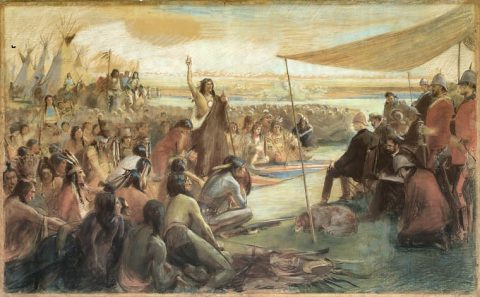The year was 2015. We had gathered in the meeting house of the remote Tl’azt’en First Nation at Tache, 215 km northwest of Prince George. I was there as volunteer Chair of the B.C. Industry Training Authority (ITA), the organization responsible for funding and facilitating trades training in the province. Accompanying me were the ITA’s CEO, Gary Herman, and other board members who shared a passion for our dual mission of helping young people gain rewarding careers in the certified trades, while also providing the skills that individuals and organizations would need to carry out virtually any public or private project throughout the province.

One of the ITA’s board members was Andy Calitz, a South African engineer who had led LNG projects around the world. Now, Andy was the CEO of LNG Canada, a joint venture by international energy companies to develop Canada’s first large export facility for liquefied natural gas. It was Andy’s leadership and determination that would make the $40 billion venture situated at Kitimat – the largest industrial project in Canadian history – a reality.
The natural gas supply for this massive project would be transported from landlocked northeast B.C. gas fields through the Coastal GasLink Pipeline. The pipeline’s construction would create opportunities for the Tl’azt’en and other First Nations members along its route to learn a trade that could provide them with satisfying and well-paying, potentially lifelong careers, and help provide prosperity for their communities.

But we faced a dilemma. Many young people from those remote villages lacked the academic qualifications normally required even to enter trades training. Learning a certified trade such as electrician, welder or heavy equipment mechanic is a four-year process of schooling and work experience.
Then came a memorable feast of bear, beaver, deer, elk and moose, along with fish from the nearby lake. The Chief was near tears as he told us that, while they had heard many leaders’ statements from afar aimed at First Nations, we were the first group of leaders to honour his people by travelling to their village. That meant more to the Chief and Council than we could have imagined.
After wrestling with our dilemma, the ITA Board decided to create an entirely new certified trade called Construction Craft Worker. Through this program, trainees would receive the foundational knowledge needed to work safely as labourers, from where they could learn the skills needed to move into advanced trades. At the invitation of the Tl’azt’en Chief, Justa Monk, and Councillors, we came to discuss our Construction Craft Worker initiative.

Chief Justa Monk offered a traditional welcome and I respectfully responded, describing our mission. Then came a memorable feast of bear, beaver, deer, elk and moose, along with fish from the nearby lake. It turned out to be an emotional day for all. The Chief was near tears as he told us that, while they had heard many leaders’ statements from afar aimed at First Nations, we were the first group of leaders to honour his people by travelling to their village. That meant more to the Chief (who has since passed away) and Council than we could have imagined. The many young band members in attendance expressed their hope that working on the pipeline might help them gain the trade qualifications needed to secure employment afterwards.
Given their remote location, our board knew the Coastal GasLink Pipeline would be their only chance in a generation to achieve that. The arduous process of gaining approval for the LNG project took much longer than expected but finally, five years after our meeting, the gas supply pipeline is under construction. And 20 First Nations along the route have signed agreements that not only offer employment opportunities, but also financial benefits that will help lift their communities out of poverty.

Who could have imagined that this long-held dream would turn into a national nightmare due to opposition by unelected “hereditary” Chiefs of just one of those 20 First Nations? And that this single, internal jurisdictional dispute could spawn illegal blockades disrupting railways, roads and international commerce across our entire nation, and even threaten shortages of things all of us need to live, like heating fuel and food? I’m sure most Canadians were as dismayed as I to see ministers of the Crown meekly asking for “permission” to enter an unlawfully occupied site to “dialogue” with a disparate agglomeration of protesters opposed to virtually everything that we value about our country.
There have been many times over the years when I’ve witnessed people who keep trying to change the behaviour of an impossibly intransigent opponent, rather than going around them to engage supporters. In this case, the way to do that is breathtakingly obvious. There are 20 First Nations who, just like the Tl’azt’en, are counting on the Coastal GasLink to help lift them out of poverty and provide opportunities for their young people to gain employable skills. If I were Prime Minister, my Cabinet ministers would immediately be on their way to each of those 20 First Nations to solicit their help in making sure the pipeline gets built.

My experience in that Tl’azt’en meeting house shows that ministers from our national government coming to meet First Nations on their own ground would be profoundly impactful in encouraging First Nations leaders who actually care about the future of their people to speak out against those who do not.
Gwyn Morgan is the retired founding CEO of Encana Corp.





